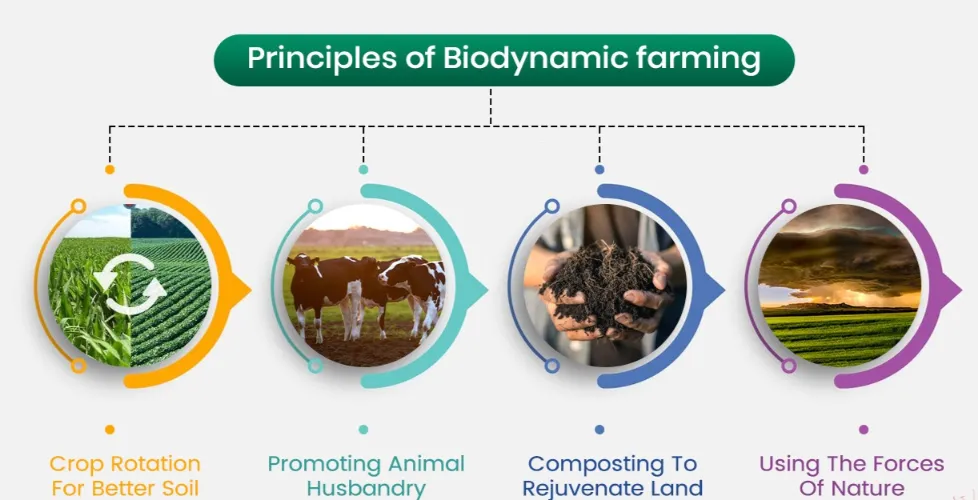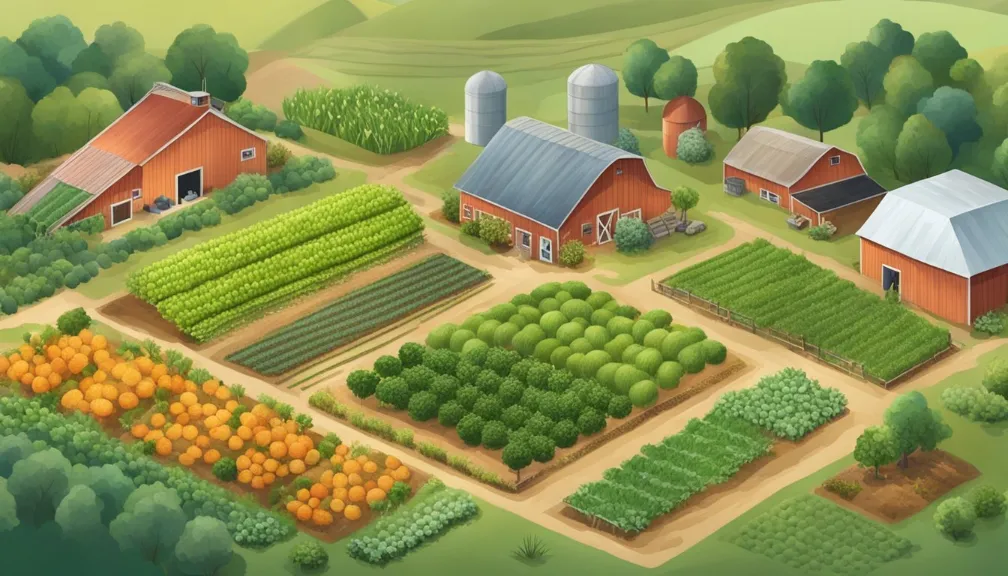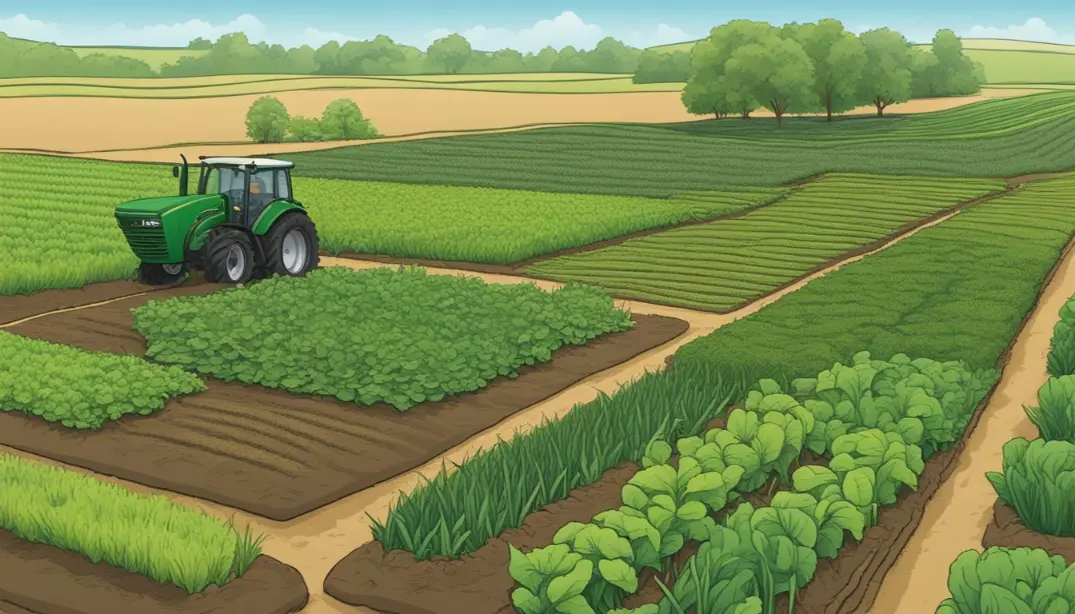Biodynamic farming is based on the work of Rudolf Steiner, a philosopher and scientist who gave a series of lectures on agriculture in 1924. He introduced the concept of the farm as a living organism, a self-sustaining system that integrates plants, animals, and soil.
He also proposed various methods and preparations to enhance the vitality and harmony of the farm, such as using compost, herbal sprays, and an astrological calendar.
In this blog post, we will explore the main principles and practices, and how they can benefit both the farmers and the consumers of biodynamic produce.
We will also share some examples of biodynamic farms and products around the world, and how you can get involved in this movement.
Principles Of Biodynamic Farming
It is based on a set of principles that aim to create a balanced and harmonious relationship between the farmer, the farm, and the cosmos. Some of these principles are:
Farm Individuality
Biodynamic farmers view their farm as a unique and living entity, with its own personality, needs, and potential. They strive to understand and enhance the farm’s individuality by observing its natural rhythms, cycles, and patterns, and by adapting their practices accordingly.
Soil Fertility
Biodynamic farmers regard the soil as the foundation of the farm, and as a living organism in its own right. They nourish and protect the soil by using organic matter, such as compost and manure, and by avoiding synthetic fertilizers, pesticides, and herbicides.
They also use biodynamic preparations, which are special mixtures of herbs, minerals, and animal substances, to stimulate the soil’s life forces and balance its elements.
Crop Diversity
Biodynamic farmers cultivate a variety of crops, including grains, vegetables, fruits, herbs, and flowers, to create a diverse and resilient ecosystem. They also practice crop rotation, intercropping, and cover cropping, to prevent soil erosion, pest infestation, and nutrient depletion.
They also select and breed crops that are suited to their local climate, soil, and culture, and that express their true nature and quality.
Animal Welfare
Biodynamic farmers raise animals, such as cows, sheep, goats, chickens, and bees, as integral parts of the farm organism, treat the animals with respect and care, and provide them with adequate space, food, water, and shelter.
They also use the animal products, such as milk, wool, eggs, and honey, to enrich the farm and the human diet. They avoid the use of hormones, antibiotics, and other artificial substances that may harm the animals or the environment.
Cosmic Connection
Biodynamic farmers recognize the influence of the sun, moon, planets, and stars on the growth and development of the plants, animals, and soil.
They use an astrological calendar, which indicates the optimal times for sowing, planting, harvesting, and applying the biodynamic preparations, based on the position and movement of the celestial bodies.
They also perform various rituals and ceremonies, such as stirring the preparations in a specific way, or burying a cow horn filled with manure, to connect with the cosmic forces and enhance the farm’s vitality.

Benefits Of Biodynamic Farming
This type of farming has many benefits, both for the farmers and the consumers of biodynamic produce. Some of these benefits are:
| Benefits | Description |
|---|---|
| Environmental Benefits | It promotes the conservation and regeneration of natural resources, such as soil, water, air, and biodiversity. And reduces greenhouse gas emissions, water pollution, and soil degradation, and increases carbon sequestration, water retention, and soil fertility. It also creates a resilient and adaptable ecosystem that can cope with climate change and other challenges. |
| Social Benefits | A sense of community and cooperation among the farmers, the consumers, and the other stakeholders involved in the food system. It supports local and regional economies, by creating jobs, income, and markets for biodynamic products. It also encourages education, research, and innovation, by sharing knowledge, skills, and experiences among the biodynamic practitioners and the wider public. |
| Health Benefits | It produces food that is nutritious, delicious, and safe to eat. Biodynamic products have higher levels of vitamins, minerals, antioxidants, and phytochemicals, and lower levels of nitrates, heavy metals, and residues, than conventional or organic products. It has also a distinctive flavor, aroma, and appearance, that reflect their origin and quality. Biodynamic food can enhance the physical, mental, and spiritual well-being of the consumers, by providing them with vital energy and nourishment. |
Best Examples Of Biodynamic Farms And Products
This type of farming is practiced in over 50 countries, on more than 250,000 hectares of land, by thousands of farmers and gardeners. Biodynamic products include grains, vegetables, fruits, herbs, flowers, wine, coffee, tea, honey, dairy, meat, eggs, and more. Some of the most well-known biodynamic farms and products are:
| Best Examples | Description |
|---|---|
| Dottenfelderhof | A biodynamic farm and education center in Germany, that has been operating since 1968. It grows over 80 crops, and raises cows, pigs, chickens, and bees. Also runs a bakery, a dairy, a butcher shop, a farm store, and a café. It offers various courses, workshops, and internships, for people who want to learn about biodynamic farming and gardening. |
| Benziger Family Winery | A biodynamic winery in California, that has been producing award-winning wines since 1980. It cultivates over 30 grape varieties, and uses biodynamic preparations, compost, cover crops, and insectaries, to enhance the soil and the vines. It also has a wildlife sanctuary, a wetland, and a garden, that attract and support diverse species of birds, insects, and animals. |
| Sekem | A biodynamic initiative in Egypt, that was founded in 1977 by Dr. Ibrahim Abouleish. It aims to create a sustainable and holistic development model for the desert. It grows organic and biodynamic crops, such as cotton, herbs, fruits, and vegetables, and produces textiles, medicines, cosmetics, and food products. And also runs a school, a university, a hospital, and a cultural center, that provide education, health care, and social services, to the local community and beyond. |
Ways To Get Involved In Biodynamic Farming
If you are interested in this type of farming, there are many ways you can get involved, such as:
Buying Biodynamic Products
You can support biodynamic farmers and enjoy biodynamic food, by buying biodynamic products from your local farmers’ market, health food store, or online retailer.
You can look for the Demeter logo, which is the international certification mark for biodynamic products, or other labels that indicate biodynamic quality and origin.
Visiting Biodynamic Farms
You can learn more about biodynamic farming and experience it first-hand, by visiting biodynamic farms in your area or around the world.
You can join farm tours, volunteer programs, or farm stays, that offer you the opportunity to see, hear, smell, taste, and feel the biodynamic farm organism.
Practicing Biodynamic Gardening
Apply biodynamic principles and practices to your own garden, whether it is a balcony, a backyard, or a community plot. You can use biodynamic preparations, compost, and seeds, to enrich your soil and grow healthy and tasty plants.
You can also follow the biodynamic calendar, and observe the natural cycles and rhythms of your garden.
Joining Biodynamic Associations
You can connect with other biodynamic enthusiasts, and access various resources and opportunities, by joining biodynamic associations in your country or region.
These associations offer membership, publications, events, training, and networking, for biodynamic farmers, gardeners, consumers, and supporters.

Conclusion
Biodynamic farming is a holistic and ethical way to grow food, that respects and enhances the life of the farm, the environment, and the people. It has many environmental, social, and health benefits, and produces food that is nutritious, delicious, and safe to eat.
It is also practiced in many countries, and produces a wide range of products, from grains to wine. You can get involved in by buying, visiting, practicing, or joining biodynamic initiatives.
Related Posts:
O Farming Investing: Online Platform, Higher Returns & Low Risks
What Is O Farming: Make Money Online, Get Start & Benefits
Industrialized Agriculture: Advantage, Disadvantages & Alternatives
Bamboo Farming: Types, Cultivation & Economic Opportunities
Palworld Farming: How To Grow And Harvest Food With Your Pals
How To Grow Pistachio From Seed: Important Steps, Tips & Tricks

Meet Our Expert Agricultural Administrator
Welcome to agrigreenhands.com, your dedicated hub for all things related to agricultural farming. Leading the way in our commitment to sustainable and innovative practices is Jawad Hussain, our esteemed administrator with a profound background in agriculture….


